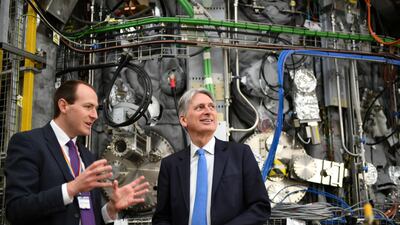Britain’s economy grew by 0.5 per cent in the first three months of this year, despite the backdrop of Brexit and uncertainty around the upcoming European elections in May.
It was an improvement of 0.2 per cent growth in GDP the previous quarter and was bolstered by a strongest quarterly performance from manufacturers since 1988, with factory output up 2.2 per cent, according to the figures from the Office for National Statistics.
Compared to the same quarter a year ago, UK GDP increased by 1.8 per cent for the first three months of 2019; up from 1.4 per cent in the first three months of last year.
Growth in the services sector slowed to 0.3 per cent in the latest quarter, but there was a noticeable pickup in growth in the production sector, driven by growth of 2.2 per cent in manufacturing output. The services sector accounts for over 75 per cent of British GDP.
The manufacturing output was driven by companies stockpiling in an event of a no-deal Brexit. This refers to when a business increases its holdings of goods in response to unexpected shocks to demand, which has been on the rise since the UK voted to leave the bloc in June 2016.
Philip Hammond, the British Chancellor, said the first-quarter growth figures showed the UK economy was “robust”, with growth of 0.5% in the first quarter “benefiting every major sector”.
“The economy has grown for nine consecutive years, debt is falling, employment is at a record high and wages are rising at their fastest pace in over a decade,” he said.
“We’re investing at record levels in our infrastructure and skills to boost productivity and wages, which will ensure that Britain is well-placed to seize the opportunities that lie ahead.”
The UK also saw the first quarter of business investment growth since the fourth quarter of 2017.
Lee Hardman, currency economist at MUFG Bank, believes that this growth in business investment “is a temporary measure”.
He told The National: "The underlying post-Brexit story is one of weakness in business investment. One of the clear trends since the Brexit referendum is that the additional uncertainty over the trading relationship has had a clear weakening impact on business investment."
“The clear big positive story was the consumer. Consumer spending continued to be strong in the first quarter which is a reassuring sign considering the bulk of the economy. That's obviously a key reason why growth has held up better than expected in the first quarter,” he added.
However, he said that he remained sceptical about whether the consumer growth is likely to be sustained.
Mr Hardman added that although the markets are largely expecting Farage’s Brexit party to do well in the European elections, further pressure for the prime minister Theresa May to step down will have a negative impact on the value of the pound.
He added that MUFG expects there to be a leadership election as early as this summer.

